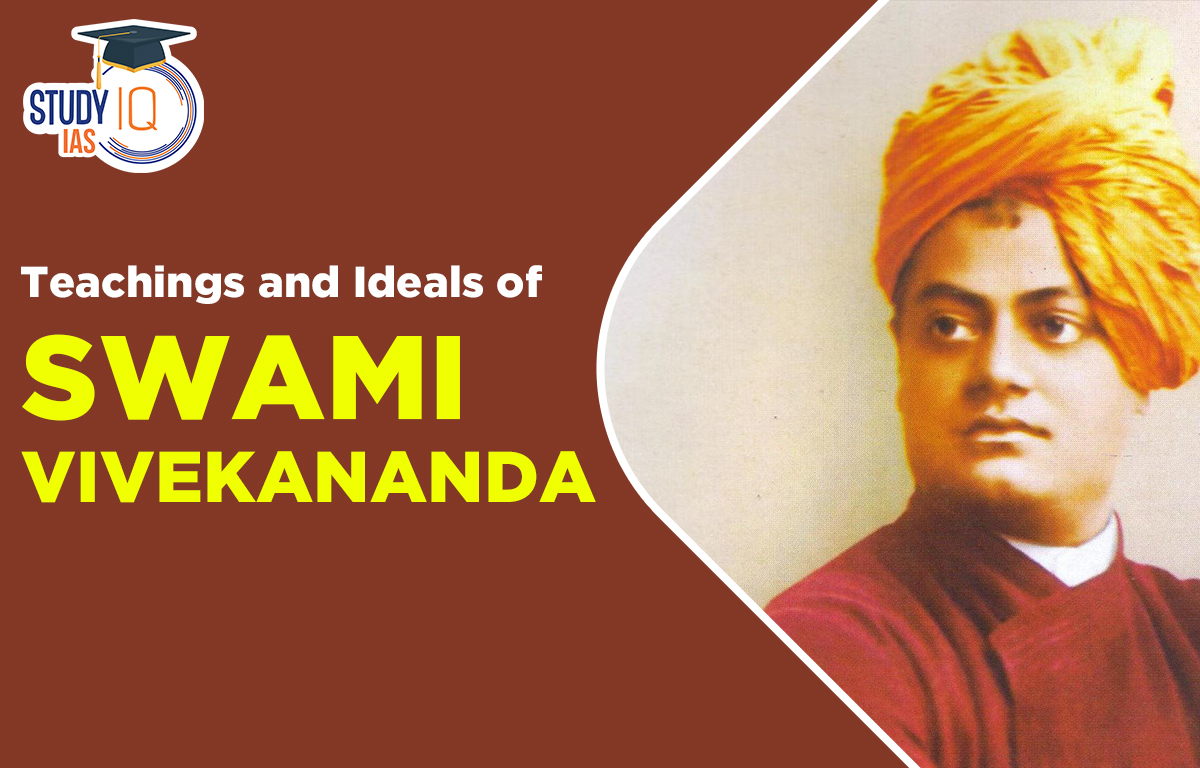Table of Contents
About Swami Vivekananda
- Swami Vivekananda was born as Narendra Nath Dutta on 12th January 1863 in Calcutta.
- Narendra embraced monkhood after getting influenced by the teachings of Swami Ramakrishna Paramahamsa.
- He attended the Parliament of Religions in Chicago in 1893, where his speech to the assembly was well received.
- He founded the Ramakrishna Mission in 1897 for promoting Vedantic philosophy and carrying out charity, social work and education.
- Contribution:
- Vivekananda is believed to be a key figure in introducing Vedanta and Yoga to the Western world, and is credited with raising interfaith awareness, and bringing Hinduism to the status of a major world religion.
- He founded the Vedanta Society of New York to teach Vedanta philosophy.
- Literature: Jnana Yoga, Karma Yoga, Bhakti Yoga, Raja Yoga. He brought out periodical Brahmavadin to teach the Vedanta.
- Famous Quotes:
- “The more we come out and do good to others, the more our hearts will be purified.”
- “Arise, awake and stop not till the goal is reached.”
- “The greatest sin is to think yourself weak.”
- “Education is the manifestation of the perfection already in man.”
- Honours: The birth anniversary of Swami Vivekananda is celebrated as National Youth Day.

Teachings of Swami Vivekananda
Vedantic Humanism
- As an exponent of Vedantic humanism, Swami Vivekananda believed that external rituals of religion are of secondary importance but the spiritual essence of a religion should be preserved and accepted.
- He believed that there is only one Self in the universe. There is only one Existence. He saw the entire universe as a manifestation of the absolute One.
- He believed religious acceptance was more important for coexistence of various faiths and not tolerance. The idea of tolerance was associated with superiority complex.
- Selfless service of man was the most desirable path for self-realization. Unity of all humans could be realized through unconditional love for all, judicious detachment, and expansion of self through service of fellow humans.
Divinity within Ourselves
- Swami Vivekananda asserted that each soul is potentially divine. Humans should aim to manifest this divinity within, which can be done by controlling nature, external and internal.
Pathways of Attaining Moksha
- Karma Yoga: Swamiji emphasizes the importance of work for attaining god. He uses Karma Yoga to teach how to employ to the maximum advantage of our energies in our work.
- Karma-Yoga teaches how to dedicate ourselves to work without worrying about the results. Our work should be our worship.
- Bhakti Yoga: Bhakti Yoga teaches that love is a vital element of all human beings and how to love without any ulterior motives.
- He believed that love is expansion, and all selfishness is contraction. Love is therefore the only law of life.
- Raja Yoga: Raja Yoga opens up the psychological way to union with God. It uses a method called concentration to acquire knowledge.
- The stronger the power of concentration, the more knowledge is acquired.
Faith in Oneself
- Swamiji says that keeping faith in ourselves is of the greatest help to us. It helps us make what we believe ourselves to be. No power in the universe can injure us unless we first injure ourselves.
- One should not shy away from taking responsibility for their actions.
Significance of Swami Vivekananda’s Teachings
- Inspiring youth: Swamiji’s teachings inspires the youths of today to realize their potential and develop personality and leadership qualities.
- It also inspires them to take up various nation-building activities, by tackling challenges such as hunger, poverty, unemployment, corruption etc.
- Egalitarian society: Swamiji considers caste system the greatest impediment in the unity and oneness of the country, and he appeals to all Indians to renounce it and break the caste based social hierarchy.
- Service of humanity: The idea of Vasudaiva Kutumbakam finds resonance in Swamiji’s teachings. He asks people to serve humanity with selflessness.
- Religious acceptance: Swamiji believes that religious acceptance is necessary for society to move forward, instead of religious tolerance.
- Nationalism: Swamiji calls upon the citizens to be ready for the sacrifice to the nation. A unified society would lay the foundation of a strong nation.
- Promoting education: Swamiji believed that education should be freed from the control of the upper class and spread to every section of the society.
- His idea of education was not just career-oriented. He talked about ‘true education’ that will boost an individual’s character.
- Women upliftment: Swamiji was in favour of allowing women to take their own decisions as it will help in their social and economic upliftment.


 BPSC AE JE Recruitment 2026 Notification...
BPSC AE JE Recruitment 2026 Notification...
 HPSC Salary and Job Profile 2026: Check ...
HPSC Salary and Job Profile 2026: Check ...
 HPSC Previous Year Paper, Download HCS P...
HPSC Previous Year Paper, Download HCS P...




















